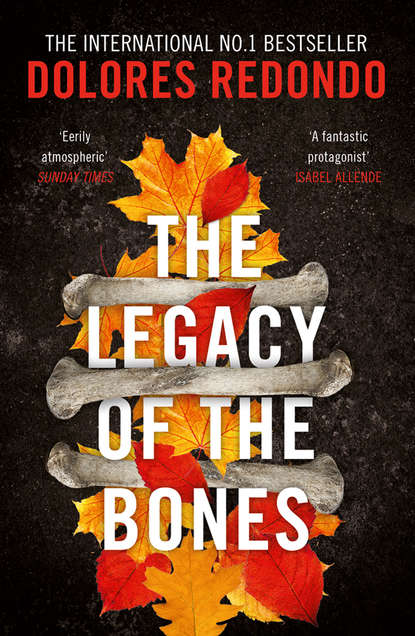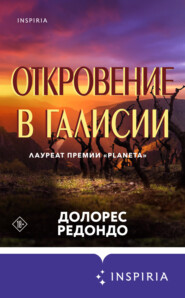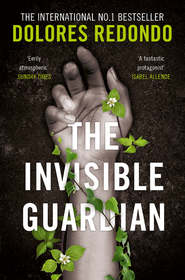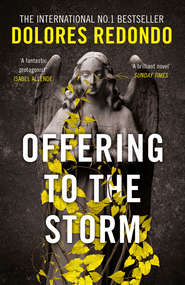По всем вопросам обращайтесь на: info@litportal.ru
(©) 2003-2025.
✖
The Legacy of the Bones
Автор
Год написания книги
2019
Настройки чтения
Размер шрифта
Высота строк
Поля
‘No, you don’t seem like that kind of woman. I’ll bet you didn’t drink at all while you were pregnant. A wise choice, otherwise you’d end up with kids like me.’ He guffawed. ‘And you’re breastfeeding now, right?’ he added.
Amaia concealed her surprise by feigning irritation, turning towards the door and pushing her chair back to stand up.
‘Hold your horses, Inspector, I’m getting there. My father used to brew patxaran at home, you see. It was nothing special, but it was drinkable. He worked for a well-known liqueur company in a small village called Azanza. When the sloe harvest was finished, employees were allowed to pick any leftover berries. My father used to take me with him out to the countryside. Those blackthorn trees are lethal, if you prick your finger it always goes septic and the pain lasts for days. I thought the ideal place for her would be among those bushes.’
‘You buried her there?’
‘Yes.’
‘Right,’ said Judge Markina, ‘you’ll be coming with us to point out the exact spot.’
‘I’m not going anywhere! The last thing I want is to see that bitch again, she’ll be disgusting by now, anyway. I can tell you which field she’s in, but the rest is up to you. I’ve kept my side of the bargain and, once this is over, I intend to go back to my cell to rest.’ He leant back in his chair again, beaming. ‘I’m feeling quite tired after all this excitement,’ he said, staring straight at the judge.
‘That’s not how this works,’ said Markina. ‘We didn’t come here so that you could play cat and mouse with us. You’ll show us the place in situ. Verbal directions could make the search difficult. In addition, it’s been a while, so there won’t be any visible signs. Even you might have difficulty remembering the exact spot.’
Quiralte interrupted Markina’s monologue.
‘Oh, for God’s sake! This guy’s a bore. Give me a pen and paper and I’ll show you, Inspector.’
Amaia handed them to him, while Markina carried on protesting:
‘A clumsy drawing doesn’t make a reliable map; in a plantation all trees look alike.’
Amaia watched Quiralte, who gave the judge a knowing smile, then started to write.
‘Don’t worry, your honour,’ he said patronisingly, ‘I’m not doing a drawing.’ And he handed them the piece of paper with a brief series of numbers and letters, which left Markina puzzling.
‘What on earth is this?’
‘Coordinates, your honour,’ Amaia explained.
‘Longitude and latitude, your honour – didn’t I tell you I was in the Foreign Legion?’ Quiralte added jauntily. ‘Or maybe you’d prefer a little drawing?’
Azanza turned out to be a small village on the outskirts of Estella, whose main industry was devoted to producing the sloe-flavoured liqueur called patxaran. By the time they managed to summon the whole team and find the location, it was growing late. The fading light seemed to be held for an instant by the millions of little white flowers, that, despite the remoteness of spring, adorned the tree branches and gave the impression of a palace corridor rather than a burial spot improvised by a cruel brute.
Amaia looked carefully around her while the forensic team installed spotlights and a tent, which she had insisted they put up regardless of the hurry they were in; although there was no real chance of rain, she didn’t want to risk clues at the site of the grave being destroyed by a downpour.
Judge Markina came over and stood next to her.
‘You look sceptical, Inspector. Do you doubt that we’ll find the body there?’
‘No, I’m pretty certain we will,’ she said.
‘Then what is bothering you? … Allow me,’ he said, raising his hand towards her face. She shrank back in surprise. ‘You’ve got something in your hair.’ He picked out a little white flower and held it to his nose.
Amaia saw Jonan glance at her from the far side of the tent.
‘Tell me, what doesn’t convince you?’
‘Quiralte’s behaviour doesn’t convince me. He’s a textbook thug, court-martialled from the army, a drunk, arrogant, violent, and yet …’
‘I know, I also find it hard to understand what made a charming woman like Lucía Aguirre associate with a man like that.’
‘Well, that I can help you with. She fits the profile perfectly. Sweet-natured, altruistic, devoted to helping others, pious and empathic to a fault. She was a catechist, helped out at a soup kitchen, babysat her grandchildren, regularly visited her elderly mother … but she was single. For a woman like that, life has no meaning unless she is caring for others, even though at the same time she dreams of someone who will come and take care of her. She yearned to feel like a woman; not a sister, a mother, or a friend, but a woman. Her mistake was to believe that to achieve this she needed a man at any price.’
‘Well, Inspector, without wishing to appear sexist, I don’t see anything wrong with a woman needing a man by her side in order to feel whole, in matters of love, at any rate.’
Jonan stopped taking notes. Keeping his head down, he grinned, his attention split between the technicians digging the pit and his superior.
‘Your honour, Quiralte isn’t a man. He’s a specimen of the male sex. There’s a big difference.’
The diggers raised the alarm as they started to uncover some black plastic sheeting. Amaia approached the grave, but not without turning to Markina to say:
‘I’m sure Lucía Aguirre also realised that, which is why she reported him. Too late.’
When the bundle was completely exposed, it was clear the murderer had placed the woman’s body inside two bin liners, top and tail, which he had then fastened at the waist with Sellotape. The tape had come unstuck and was fluttering in the breeze, creating an eerie sensation of movement, as if the victim were writhing in her grave, clamouring to be let out. A sudden gust revealed the victim’s red-and-white pullover among the folds of the bag. Amaia recognised it from her dream. A shiver ran down her spine.
‘I want this photographed from every angle,’ she ordered. While waiting for the photographers to do their work, she stepped back a few paces, crossed herself, and, lowering her head, said another prayer for the victim.
Judge Markina stood gaping at her, as Dr San Martín approached.
‘It’s just another way of distancing oneself from the dead,’ he murmured to Markina, who looked away, shamefaced.
Stepping over the grave, Dr San Martín took a pair of nail scissors from his bag, then glanced at Markina, who gave a nod of approval. With a single movement, he snipped the plastic lengthways, exposing the top half of the body.
The corpse lay fully outstretched, tilted slightly on its right side. Decomposition was relatively advanced, although somewhat delayed by the cold, dry soil. The flesh looked sunken and shrivelled, above all on the face.
‘Fortunately, because of the recent cold weather, the degree of decomposition is less than you’d expect after five months,’ San Martín explained. ‘At first glance, the corpse presents a deep gash to the throat. Bloodstains on the pullover indicate the victim was still alive when this was done to her. The wound is deep and straight, indicating an extremely sharp blade and a clear intent to cause death. There is no sign of hesitation; what’s more, the wound travels from left to right, suggesting her assailant was right-handed. Blood loss was extreme, so that despite being well wrapped up in relatively dry ground, there is abundant evidence of insect activity in the initial phase.’
Amaia approached the head of the grave and crouched down. Tilting her head slightly to one side, she remained like that for a few moments, as if she were feeling dizzy.
Judge Markina looked at her with concern. He moved towards her, but Jonan restrained him with a gesture, then whispered something in his ear.
‘That mark on her eyebrow, is it from a blow?’ asked Amaia.
‘Well spotted,’ said San Martín, beaming with the pride of a teacher who has trained his pupil well, ‘and it would appear to be post-mortem, because there’s an indentation but no bleeding.’
‘Look,’ said Amaia, pointing, ‘there seem to be others all over her head.’
‘Yes.’ San Martín nodded, leaning closer. ‘There’s some hair missing here, which isn’t due to decomposition.’
‘Jonan, take a photograph from here, will you?’ asked Amaia.
Markina crouched down beside Amaia, so close that he brushed her with his jacket sleeve.
He murmured an apology, then asked San Martín if the body had been there the entire time or if it had been brought there immediately after death. San Martín said he thought it had, explaining that the maggots’ remains corresponded to early stage soil fauna typical of the area, but that he would only know for sure when he had carried out all the relevant tests.
Markina stood up and walked over to the judicial clerk, who was busy taking notes at a discreet distance.











